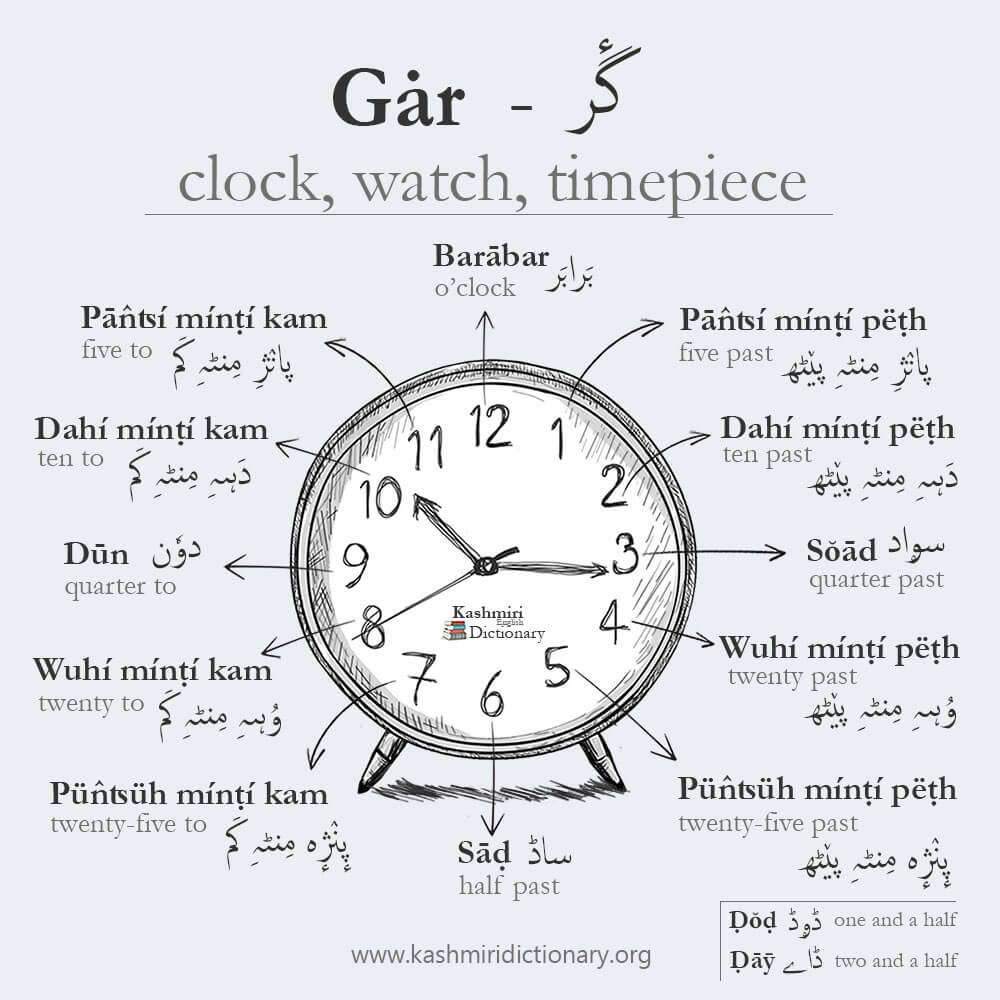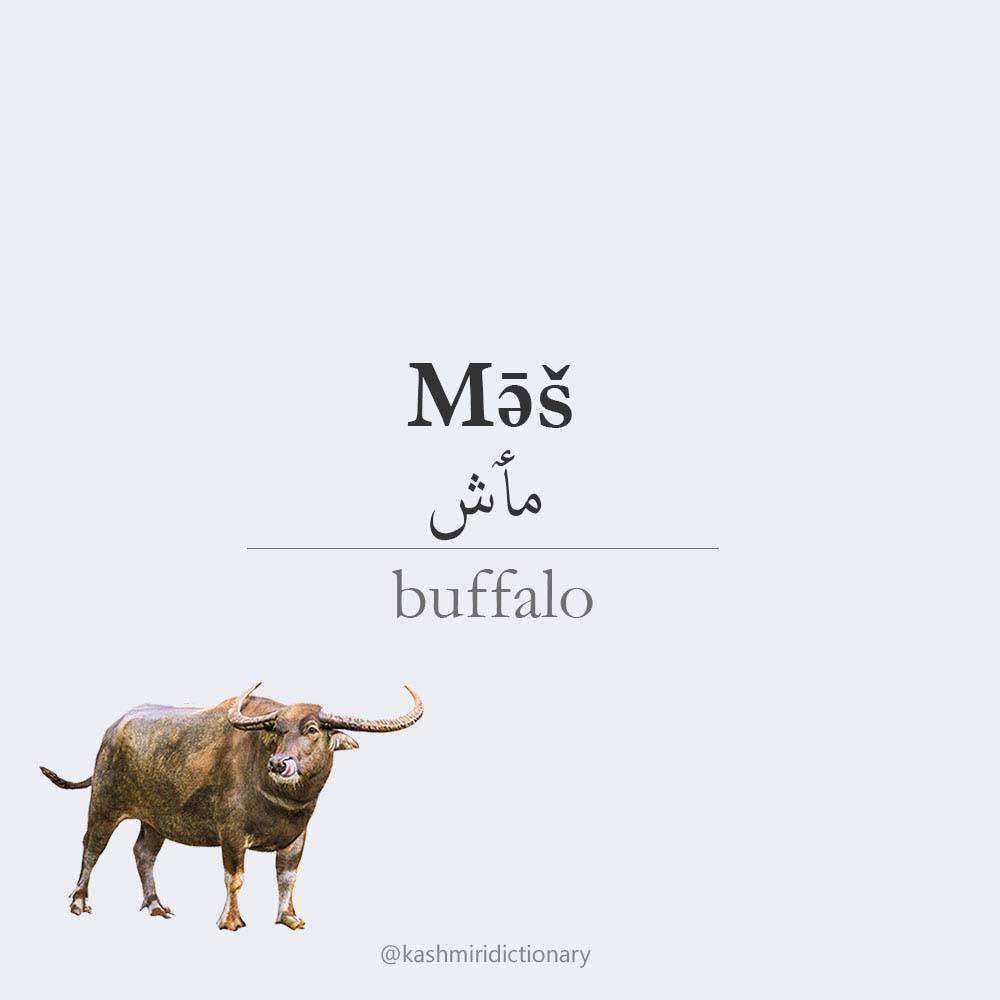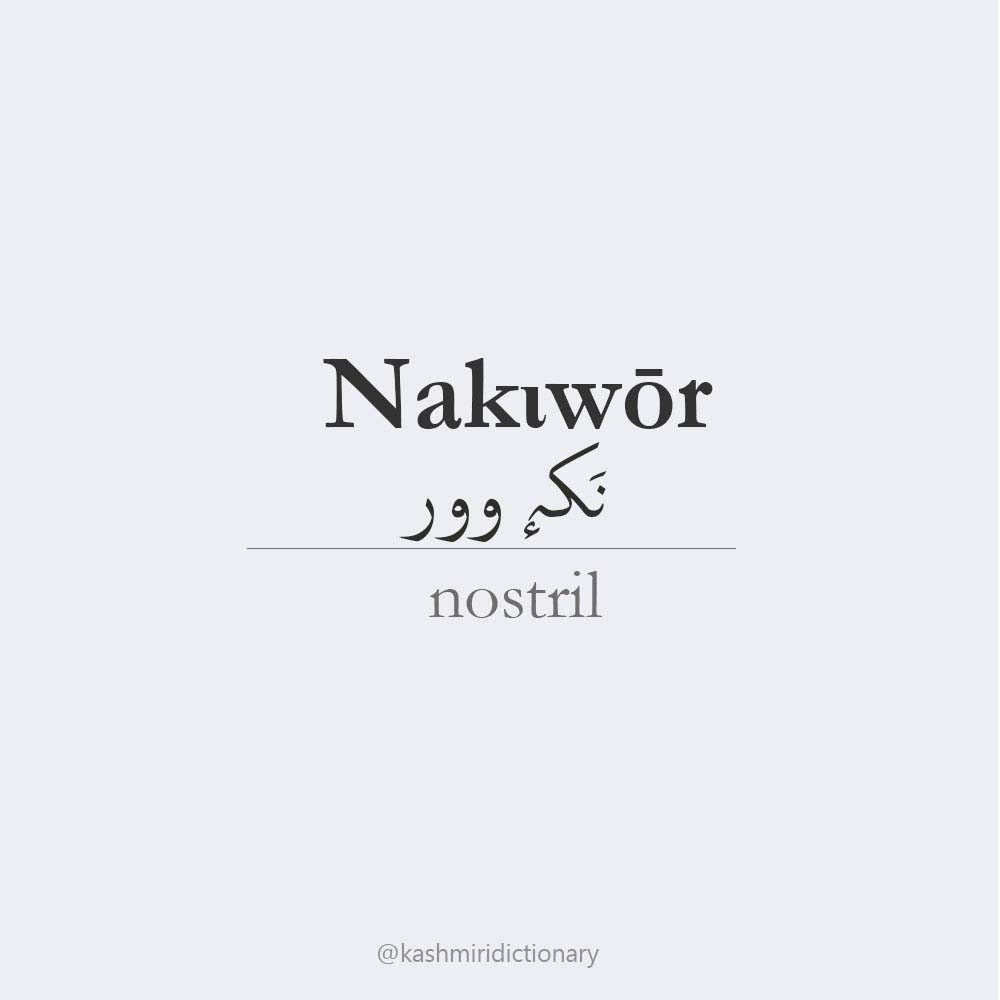How to ask the time in Kashmiri
Let’s start with the casual way of asking the time that works in most situations. You can use this mode to communicate with friends, family, or someone that you already know.
Bajay Kaets ? – What time is it? Tse che pai bajay kaets ? – Do you know the time?
If you want to be more polite and respectful to the other person, or if you’re speaking with a stranger, then you can use these more formal phrases:
Tohi ma hez chav pai bajay kaets ? — Do you have the time, please? Bajay kaets hez? — What is the time, please?
And if you’re just casually asking a close friend for time, you can ask them
Bajay Kaets ? – What’s the time?
You’ll be able to understand the time for sure if they show you on their watch, but if they read it out, you’ll need more vocab. Let’s go the extra mile and learn how to tell the time.
How to tell the time in Kashmiri
In Kashmiri, time is based on the 24-hour clock, whereas in English, the 12-hour clock is used more frequently. The simplest and the most common way to tell the time in Kashmiri is “kaal” + Time (hours + minutes).
We measure time mainly with seconds, minutes, and hours: Brunz / minit / gante/
Let’s start with the hours in Kashmiri (24-hour clock)
- It’s one o’clock. – akh bajay barabar
- It’s 11am. – subhich kah bajay
- It’s 7 pm. – shaamchi sath bajay
- It’s 12 midnight.– raets sinz bah bajay
- It’s seven o’clock. – sath bajay barabar
- It’s nine o’clock. – nav bajay barabar
Now, to add the minutes (24-hour clock)
It is very easy to add in the minutes to the time, just mention the number of minutes after the hour.
For example:
- Ze bajith pancwanza minit bajay – It’s 2:55am
- Pants bajith panda bajay – it’s 5:15pm
- Saadi nav bajay means it’s 9:30am
Different times of day in Kashmiri
The numbers give us the specific time, but it’s also normal to refer to the general time of day rather than being specific. Here are a few expressions that are frequently used in relation to time.
Morning •/ Subhai- : Anytime between 12 am and 12 pm is considered “subahi,” marking the beginning of the day.
Noon •/ Peshun – : When someone uses the term “pesshun,” they are referring to 12 pm, which is the beginning of the afternoon.
Afternoon / at midday•/ Mandínĕn مَندِنؠن : mandineyn •/ The word “afternoon” refers to any time between 12 pm to 5 pm
Evening / Shaam – The time the evening starts and ends varies between cultures and location, but often refers to any time between 5 pm and 9 pm.
Night / Kaalchan – Again, the time night starts and ends varies, but typically refers to any time between 9 pm and 6 am.
Midnight / Raat kyut – As its name indicates, “midnight” means 12 am.
Kāl کال •/ kaal •/ time, season, juncture, space, while, period /
Pačh پَچھ •/ pachh •/ fortnight
Wȧrī ؤری •/ waeree •/ a year
Rĕth رؠتھ •/ reyth •/ month(s)
ābühawā آبہٕ ہَوا •/ aabι hawaa •/ climate, atmosphere
Synonym:
mūsím موٗسِم
Sōn̂th سونٛتھ •/ soanth •/ spring
Synonym:
Bahār بَہار
Dŏhlī دۄہلی •/ dwohlee •/ in the daytime
Mandínĕn مَندِنؠن •/ mandineyn •/ at midday
Dŏhaȳ دۄہَے •/ dwo:hai •/ everyday /
synonym:
pr̂ath dŏhü پرَٛتھ دۄہہٕ
Dŏh دۄہ •/ dwoh •/ day, days /
Gȧr گٔر •/ clock, watch, timepiece

Barābar بَرابَر •/ o’clock
Pān̂ʦí mínṭí pëth پانٛژِ مِنٹہِ پێٹھ •/ five past
Dahí mínṭí pëth دَہہِ مِنٹہِ پێٹھ •/ ten five past
Sŏād سۄاد •/ swoaad •/quarter past
Wuhí míntí pëth وُہہِ مِنٹہِ پێٹھ •/ Wuhí mínṭí pyetth •/ twenty past
Pün̂ʦüh mínṭí pëth پٕنٛژٕہ مِنٹہِ پێٹھ •/ twenty-five past
Sād ساڈ •/ half past
Pün̂ʦüh mínṭí kam پٕنٛژٕہ مِنٹہِ کَم •/ twenty-five to
Wuhí mínṭí kam وُہہِ مِنٹہِ کَم •/ twenty to
Ḍūn دوٗن •/ doon •/ quarter
Dahí mínṭí kam دَہہِ مِنٹہِ کَم •/ ten to
Pān̂ʦí mínṭí kam پانٛژِ مِنٹہِ کَم •/ five to
Ḍŏḍ ڈۄڈ one and a half
Ḍāy ڈاے two and a half
Br̂on̂ṭhus برٛونٛٹھُس •/ next year /
Parus پَرُس •/ last year, yesteryear •/
Pr̂ärŷus / pērŷus پرٛٲریُٛس / پیریُٛس •/ year before last year •/
pērŷus پیریُٛس •/ year before last year
Kälⁱ kĕth کٲلؠ کؠتھ •/ kaael keth •/ day after tomorrow /
Ōtrü / Ūtru اوترٕ/ اوٗترٕ •/day before yesterday /
Synonyms:
yavü یَوٕ راتھ
yavü rāth یَوٕ راتھhttps://kashmiridictionary.org/otru-day-before-yesterday/?preview=true
Related words:
Pōš kāl پوش کال •/ poash kaal •/ saffron harvesting season
Sōn̂th kāl سونٛتھ کال •/ soanth kaal •/ spring season
ṡubḥas صُبحَس •/ in the morning, tomorrow, tomorrow morning /
Synonyms:
ṡubḥan صُبحَن
ṡubḥunas صُبحُنَس
Pagāh پَگاہ •/ pag:aah •/ tomorrow
Synonyms:
ṡubḥan صُبحَن
ṡubḥas صُبحَس
Today / az اَز •/
01: Rāth راتھ •/ raath •/ yesterday /
02: Rāth راتھ •/ raath •/ night-time/
Days of the week in Kashmiri
- Haftü – ہَفتہٕ •/ hafti •/ week, a period of seven days /
- Sunday •/ Athwār – آتھوار
- Monday •/ tsandrwār – ژٔنٛدرٕوار
- Tuesday •/ Bomwār بوم وار
- Wednesday •/ Bodwār بۄد وار
- Thursday •/ Breswār برٛؠسوار
- Friday •/ Jummah جُمعہ ( Synonym:) Shukurwar شۆکُروار
- Saturday •/ Batwār بَٹہٕ وار
Months in Kashmiri
It is very easy to add in the minutes to the time, just mention the number of minutes after the hour.
For example:
- January / Tsithir –
- Febraury / Waheak –
- March / Zeeth –
- April / Hār –
- May / Shrāwun –
- June / Baeder –
- July / Ashud –
- August / Kārtik –
- September / Monjehoor –
- October / Poh –
- November / Māgh –
- December / Phāgun –


